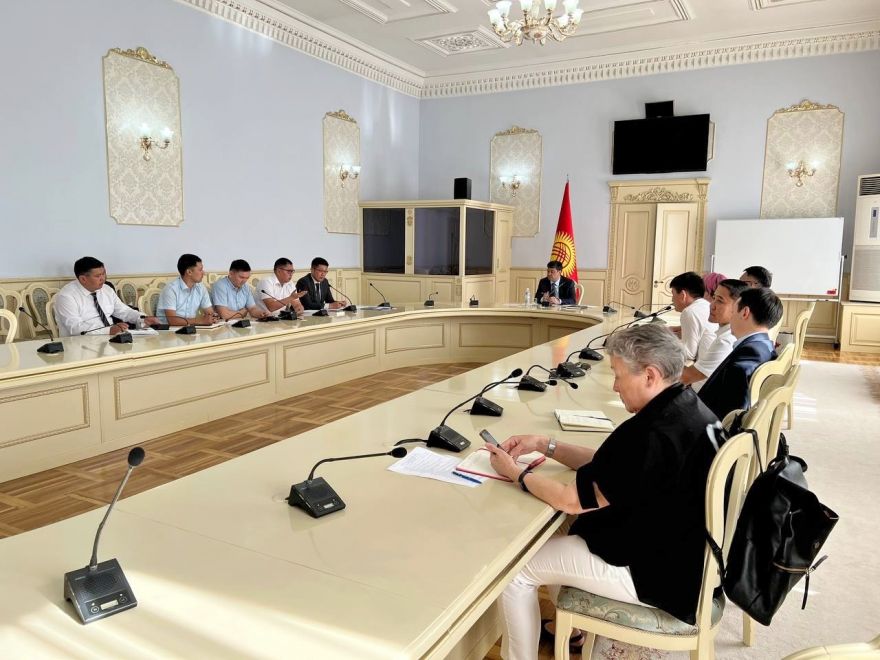News /
IBC news /
Tax legislation: How to improve the business situation?
On June 7, 2022, Deputy Chairman of the Cabinet of Ministers Bakyt Torobaev discussed with representatives of the business community issues arising from the application of the new Tax Code, which entered into force on January 1 this year.
Executive Director of the International Business Council Askar Sydykov announced at the meeting the recommendations of the business association on some issues of tax legislation.

Change restriction
The business community proposes to eliminate the rule on limiting amendments to the Tax Code no more than once a year. The Tax Code must promptly respond to modern challenges and changes based on the results of the analysis of the enforcement of tax legislation.
“Given the numerous issues that arose during the development and after the adoption of the Tax Code, it is obvious that even now there is a need for its constant improvement and amendment. It is necessary to remove the threshold of 30 million soms so that people can choose either a general or a simplified tax regime for any turnover. It is necessary to reduce single tax rates for certain types of activities, such as tourism, public catering,” the IBC head said.
Many other changes need to be made now, but the Cabinet of Ministers has to accumulate them all and submit a single package to the Parliament. There are also initiatives from the MPs, but their promotion may be difficult due to this restriction.
“At such a time of crisis, business and the economy cannot wait for months or years for the adoption of amendments to the Basic Law for Business,” added Sydykov.
It is quite possible to ensure the stability of tax legislation and to avoid making "rash" changes, using the existing mechanisms. They include a broad discussion of the proposed changes with all interested parties, an open process for making changes, the development of draft regulations based on strategic documents and plans.
According to the Tax Code, amendments to it can be made no more than once a year. They come into force on January 1 of the next calendar year, except in a number of cases, for example, force majeure circumstances.
Written clarification mechanism
The next issue concerns the improvement of the mechanism for providing written explanations on the application of tax legislation.
With the introduction of the new Tax Code, the Ministry of Economy and Commerce has been given new functions — to provide written explanations on the application of the Tax Code and tax legislation in general, which are binding on tax officials.
Businesses have proposals to systematize this practice. First of all, it is necessary to improve the quality of elaboration of issues when giving explanations on taxes.
“These clarifications should be carefully worked out, taking into account the systematic nature of the issues, as well as the consequences of giving clarifications,” the IBC head said.
In order to eliminate the influence of the human factor, it is proposed to develop a methodology for providing written explanations on the application of tax legislation.
The interpretation of tax laws should be uniform. For example, if two companies apply on an identical issue, then the explanations should be identical.
It is also important to ensure the openness of the written explanations provided by publishing them in a special section of the website of the Economy Ministry. Such a section exists (http://mineconom.gov.kg/eips/search.html), but there is no information on it yet.
“Openness of clarifications will reduce the subjectivity of interpretations, corruption risks, as well as the costs of the ministry in providing clarifications on similar issues,” said Sydykov.
Business would like to receive written clarifications in a timely manner, when they have not lost their relevance. The clarifications should be developed on the basis of an ongoing analysis of tax law enforcement, to identify the relevance of not only regulations, but also the clarifications given earlier.
Reverse VAT
Another issue that Sydykov raised at the meeting was the payment of reverse value added tax (VAT paid by the tax agent).
Entrepreneurs believe that the obligation to pay reverse VAT should only apply to VAT payers. In this case, the VAT paid is taken as a credit, as proposed in the draft Tax Code.
For taxpayers who are not registered as VAT payers, this is not possible, and reverse VAT is an additional expense.
Sales tax
According to the current Tax Code, the sales tax rate for the sale of goods, works and services subject to VAT and / or exempt from VAT, if this tax is paid in a non-cash form, is set at 0 percent, but only until January 1, 2023.
Business recommends to remove the time limit for the zero sales tax rate. Such changes in the Tax Code were planned, but have not yet been made.
The time limit will negatively affect the development of a cashless payment system and may cause an increase in shadow turnover.
Transfer pricing
Business proposes to develop clear transfer pricing mechanisms for tax purposes. According to the Tax Code, when exercising control over the calculation of taxes, tax authorities have the right to verify the correctness of the application of prices for certain types of transactions (methods of transfer pricing), including when making foreign trade transactions.
Judicial practice shows that the tax and judicial authorities do not have clear rules and methods of transfer pricing for tax purposes. It is recommended, despite the presence of some norms in the Tax Code, to develop a separate methodology for determining market prices.
In other countries, there are separate normatively fixed methods for determining market prices. For example, Kazakhstan has a Law on Transfer Pricing, while Kyrgyzstan has only a few articles in the Tax Code.




























